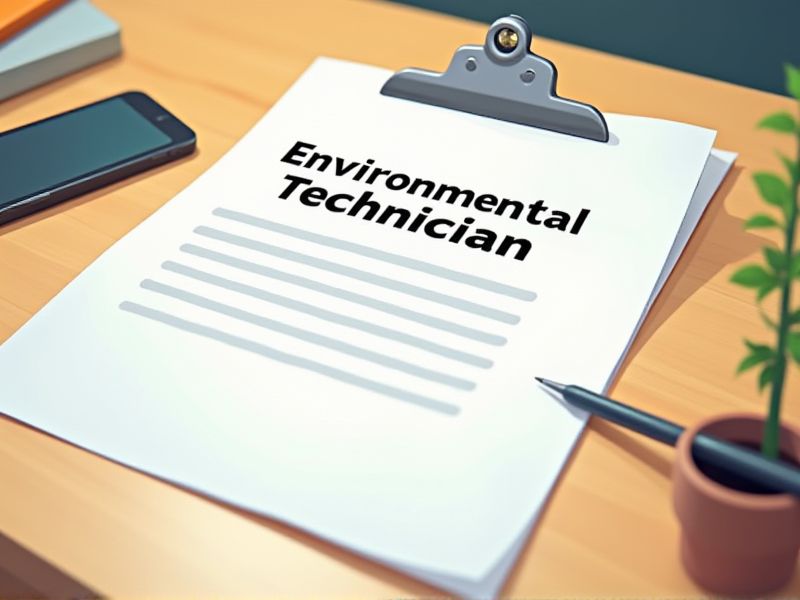
Environmental Technicians play a crucial role in monitoring and mitigating environmental impacts, ensuring compliance with environmental regulations. Certifications in this field are designed to validate the specialized skills and knowledge required to handle environmental data, hazardous materials, and safety protocols. These certifications enhance credibility and can be critical for navigating complex regulations and improving job prospects. Important certifications you may need for an Environmental Technician include those in hazardous waste management, air and water quality monitoring, and ecological assessment.
OSHA 10-Hour Training Certification
OSHA 10-Hour Training Certification helps Environmental Technicians understand health and safety standards, reducing workplace accidents. The training increases awareness of potential environmental hazards, such as chemical exposures and biological risks. Employers often require this certification to ensure compliance with federal regulations and enhance workplace safety culture. Holding this certification can lead to improved job opportunities and increased trust from clients and employers.
HAZWOPER Certification
HAZWOPER Certification ensures Environmental Technicians understand how to handle hazardous substances safely, reducing workplace injuries. It provides training on emergency response and containment procedures, enhancing on-site safety and compliance with regulations. Regulatory bodies mandate such certifications to standardize the abilities and knowledge of workers dealing with environmental hazards. Employers prefer certified technicians, as it minimizes liability and demonstrates a commitment to safety standards.
EPA Water Treatment Plant Operator Certification
The EPA Water Treatment Plant Operator Certification is essential for an Environmental Technician to ensure compliance with federal and state regulations for water safety and quality. This certification provides the necessary skills to effectively manage water treatment processes and address potential contamination issues. Holding this certification demonstrates a technician's commitment to public health and environmental protection, which boosts credibility and trust. It is often a prerequisite for employment, as it signifies the operator's ability to competently perform critical tasks in managing water systems.
EPA Air Monitoring and Compliance Certification
The EPA Air Monitoring and Compliance Certification is essential for environmental technicians because it ensures they have the knowledge to correctly measure and interpret air quality data. Proper certification allows technicians to accurately identify pollutant levels, leading to effective mitigation strategies and regulatory compliance. Trained technicians help industries adhere to legal air quality standards, thus minimizing public health risks associated with poor air conditions. Certification also equips technicians with the skills to use advanced monitoring technology, improving the overall reliability of collected data.
Certified Environmental Professional (CEP)
Certified Environmental Professionals (CEPs) possess specialized skills and knowledge, which enhances the effectiveness of environmental technicians in the field. Their expertise ensures compliance with environmental regulations, thereby reducing potential legal and financial risks for organizations. CEPs provide guidance on best practices, improving the quality of environmental assessments and mitigation strategies. They also bring credibility to projects, fostering trust among stakeholders and the community.
Certified Industrial Hygienist (CIH)
A Certified Industrial Hygienist (CIH) is essential for an Environmental Technician to ensure accurate identification and assessment of potential health hazards in the workplace, leading to better prevention strategies. The presence of a CIH enhances the development of effective risk management plans, reducing workplace-related illnesses and injuries. Their expertise in air quality, noise control, and chemical safety aids technicians in implementing compliance standards and regulations. CIHs provide valuable training and guidance, empowering technicians to effectively monitor and maintain safe environmental conditions.
RCRA Training Certification
RCRA Training Certification is essential for environmental technicians as it equips them with the knowledge to properly handle and dispose of hazardous waste, ensuring compliance with federal regulations. This certification helps in minimizing the risk of environmental contamination and protects public health by ensuring safe waste management practices. Regulatory compliance reduces the likelihood of legal penalties and enhances the credibility of organizations managing waste. Effective training in RCRA protocols contributes to the overall sustainability efforts by promoting responsible environmental stewardship.
ISO 14001 Environmental Management Systems Lead Auditor Certification
The ISO 14001 Environmental Management Systems Lead Auditor Certification empowers environmental technicians to effectively assess, analyze, and improve an organization's environmental impact. Holding this certification enhances an individual's credibility, making them more competitive in a job market that increasingly values sustainability expertise. This expertise helps organizations comply with environmental regulations, reducing the risk of legal penalties and fines. Enhanced environmental practices often lead to cost savings and improved operational efficiencies for companies that employ certified professionals.
Certified Hazardous Materials Manager (CHMM)
The presence of a Certified Hazardous Materials Manager (CHMM) ensures that complex regulatory requirements and safety standards are met, providing crucial guidance for Environmental Technicians. With the CHMM's expertise, technicians can navigate hazardous material management safely and efficiently, minimizing environmental risks. A CHMM provides comprehensive training that enhances an Environmental Technician's understanding of risk assessment and emergency response. Their leadership results in compliance with environmental laws, reducing the likelihood of legal and financial repercussions.
Environmental Site Assessment Certification
Environmental Site Assessment Certification equips environmental technicians with the knowledge to identify potential contamination risks, ensuring compliance with regulatory standards. It enhances their credibility and proficiency in conducting assessments that are critical for public and ecological safety. Certified technicians are more adept at producing accurate reports, which aid in making informed decisions on land use and remediation efforts. This certification also opens up more employment opportunities and career advancement within the environmental field.
Summary
When you, as an Environmental Technician, obtain certifications, your employment opportunities typically expand due to enhanced credentials. Certified technicians often see increased credibility, leading to greater trust from employers and clients. This recognition frequently results in higher earning potential and career advancement prospects. Certification also often equips you with updated knowledge, boosting technical skills vital for addressing complex environmental challenges.
